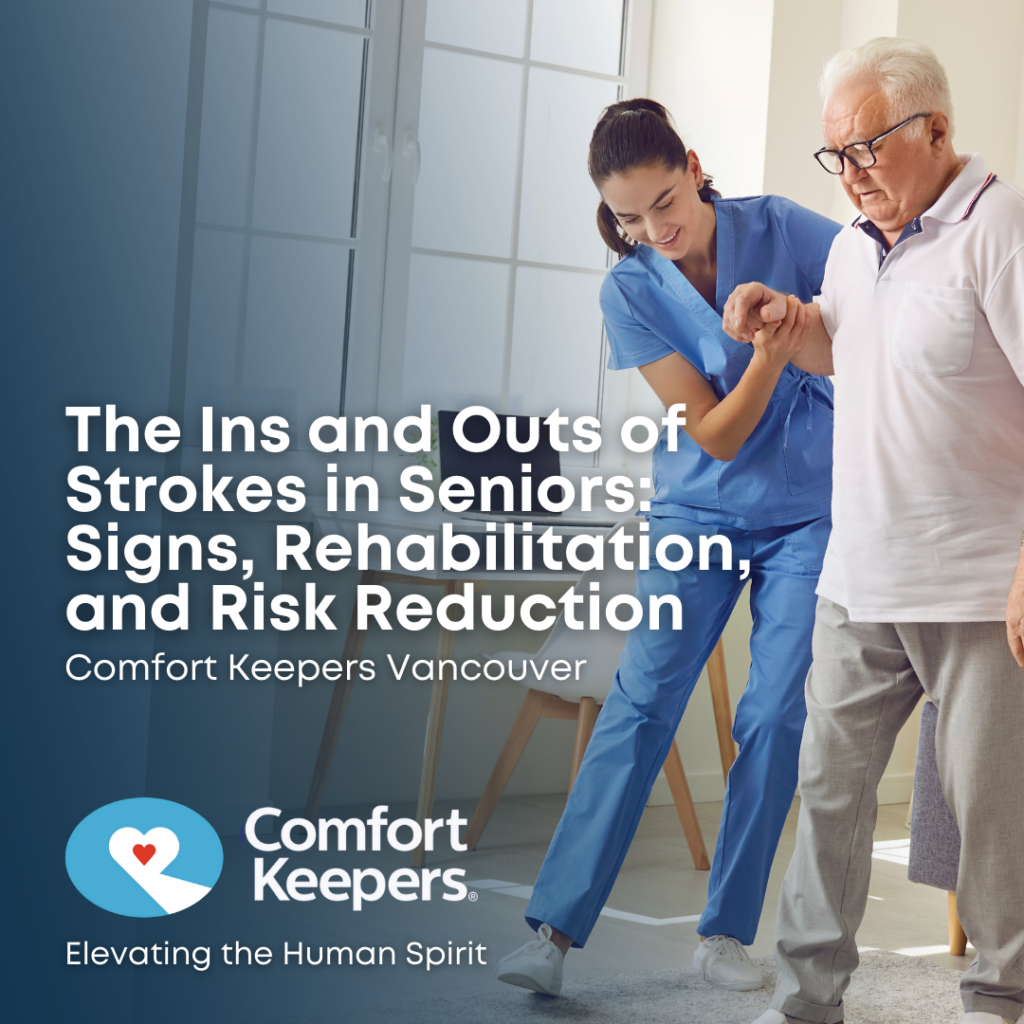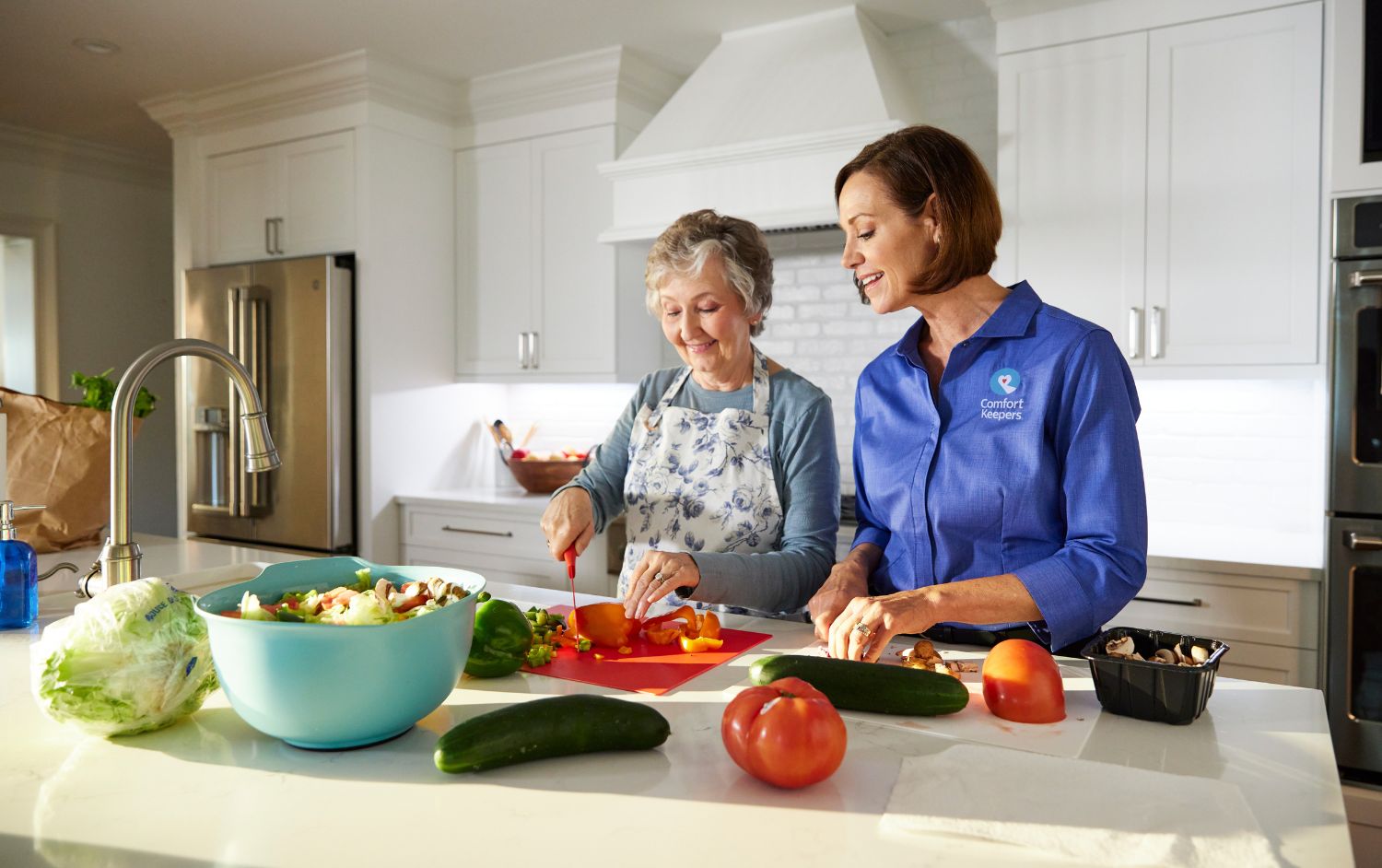Strokes in Seniors: The Signs, Rehabilitation, and Risk Reduction
Senior Stroke Care | February 16, 2024

What Every Senior in Vancouver, BC, Needs to Know About Stroke Risk, Reduction and Rehabilitation
Do you know the signs of strokes in seniors? Each year in Canada, there are more than 50,000 new cases of stroke, with one occurring every 10 minutes. The majority of these strokes (about 75%) happen to individuals over the age of 65.
We often think of stroke as paralysis on one side of the face, sudden confusion, or a severe headache. While these are all indications of a stroke, they only touch upon the basics. The key is to understand why strokes occur and how to effectively manage them to minimize death and long-term brain damage.
Types Of Strokes in Seniors
The “ischemic stroke” is the more common type of stroke. Ischemic strokes make up approximately 80% of all cases and happen when a blood vessel leading to the brain becomes obstructed. This blockage restricts blood flow to the brain, resulting in a lack of oxygen. As little as one minute without oxygen and vital nutrients can cause brain cells to perish.
A stroke known as a hemorrhagic stroke, makes up 20% of all cases. This occurs when blood enters the brain and causes harm to neural cells. Typically, this type of stroke is caused by an aneurysm that ruptures due to unmanaged hypertension.
Signs Of Strokes in Seniors
With all strokes, timing is crucial for care. A delay in treatment can lead to permanent brain damage, even when the cells do not immediately die. Recognizing the signs of a stroke can be challenging. Depending on the type of stroke, symptoms may be subtle. Especially for seniors who are more prone to strokes than any other age group.
The following are indications to be aware of in yourself and elderly family members. Know when to seek urgent medical help.
- Confusion or sudden changes in behaviour
- Partial loss of vision
- Sudden trouble walking and dizziness
- Sudden loss of coordination
- Sudden severe headache
- Sudden difficulty speaking or understanding others
- Onset of weakness or paralysis of any part of the body
- Double vision
Do not hesitate or delay contacting emergency service if you notice any of the above warning signs. Timing is everything when trying to avoid irreversible harm done to the brain. Treatment success largely depends on a diagnosis within three hours of onset and arriving at the hospital within one hour.
Strokes in Seniors: Rehabilitation
The necessary rehabilitation varies greatly based on the severity of stroke damage but typically involves at least one form of therapy or a combination. Physical therapy aids in relearning basic motor skills – from walking to lying down – through targeted exercises. Occupational therapy is also beneficial, assisting patients in regaining abilities for daily tasks like bathing, dressing, eating, and reading/writing. Speech therapy may also be suggested as a means of rebuilding communication skills.
Hypertension is often the culprit behind strokes. Therefore, doctors may recommend medication to regulate blood pressure and prevent the formation of blood clots.
Strokes in Seniors: Prevention
Over the past few decades, there has been a noticeable rise in the survival rate for strokes. According to the American Heart Association, although stroke used to be the fourth leading cause of death in the United States, it has now dropped to fifth place. While credit can be given to improved understanding of warning signs and successful treatment methods, education on recommended lifestyle modifications has also played a significant role.
Below are some suggestions that your loved one can implement to lower their chances of experiencing a stroke:
- Manage blood pressure
- Minimize stress (through healthy outlets)
- Quit smoking
- Limit consumption of alcohol
- Exercise regularly (upon physician approval)
- Maintain a healthy weight
- Modify diet to include foods that are low in saturated fat and sodium
- Manage cholesterol levels (consult your physician for options)
Initiating risk reduction involves maintaining a healthy lifestyle. Despite a family history of stroke, it is recommended to urge your older relative to adhere to these recommendations. Additionally, book regular medical appointments with a healthcare provider to identify any other potential risk factors and preventive measures.
The Best Senior Home Care Provider in Vancouver, BC, is Comfort Keepers®
Many families prefer Comfort Keepers® when arranging senior home care services for a loved one in or around Vancouver, British Columbia.
If you are concerned about the health and well-being of your aging loved ones, we can help with 24-hour care. Comfort Keepers Vancouver also provides home care services like respite care, overnight care, Alzheimer’s disease and dementia care, personal care, and more!
Comfort Keepers® Vancouver Can Help with Companion Care and Interactive Caregiving™
Personal and empathetic care starts in the heart and allows us to meet our clients’ needs. Comfort Keeper’s philosophy is to elevate the human spirit, and our caregivers ensure your loved one experiences a better quality of life.
Trained caregivers help provide our senior clients with personal home care to help maintain the highest possible quality of life, keeping them happy and healthy at home. Our Interactive Caregiving™ delivers a system of care that addresses safety, nutrition, mind, body, and activities of daily living (ADLs).
Bring The Best Home Care Assistance for Seniors Right Where You Live with Comfort Keepers®
Comfort Keepers® Vancouver is proud to provide elder care in homes throughout Vancouver, keeping seniors safe in their homes. We provide home care for the seniors of Vancouver and the surrounding areas of Burnaby, Langley, Maple Ridge, and Richmond. Please call (604) 689-8609.
Personal Care and Senior Homecare in Vancouver, BC
Learn more about our unique service, which offers personal care, companionship care, palliative care, and end-of-life care by contacting the Comfort Keepers® Vancouver office.
Accredited and Quality Respite Care Available 24/7 for British Columbia Families
Accreditation Canada has awarded Comfort Keepers® Vancouver with Exemplary Standing. This designation is only achieved after an organization’s policies, procedures, and processes undergo a thorough evaluation by industry experts to ensure they meet or exceed the stringent quality standards set by Accreditation Canada for Home Care companies.
References:
- MedicineNet.com. “Stroke Symptoms and Treatment” by Benjamin Wedro, Charles Patrick Davis. Web. 2017.
- NIH Senior Health. “Stroke.” Web. 2017.
- American Heart Association. “About Stroke.” Web. 2017.
Individualized Home Care Options
Long-Term Home Care, 24 Hour Home Care & Short Term Care Options Customized for You







